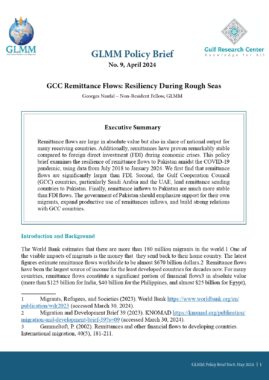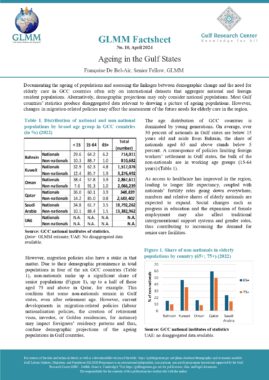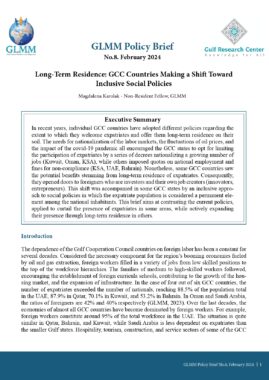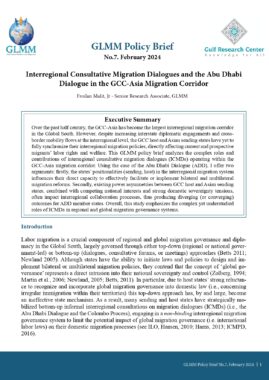Saudi Arabia: Labour Force Participation rates by nationality (Saudi /non-Saudi) and sex (%, Q1 2017-Q2 2022)
| Saudis | Non-Saudis | Total | |||||||
| Males | Females | Total | Males | Females | Total | Males | Females | Total | |
| 2017 Q1 | 61.90 | 17.40 | 40.30 | 94.10 | 29.20 | 75.60 | 78.00 | 20.90 | 55.10 |
| 2017 Q2 | 62.10 | 17.40 | 40.30 | 94.00 | 21.60 | 73.40 | 78.20 | 18.70 | 54.20 |
| 2017 Q3 | 62.60 | 17.80 | 40.70 | 93.80 | 24.90 | 74.20 | 78.40 | 19.90 | 54.80 |
| 2017 Q4 | 63.40 | 19.40 | 41.90 | 94.20 | 24.20 | 74.20 | 79.00 | 20.90 | 55.60 |
| 2018 Q1 | 63.50 | 19.50 | 41.90 | 93.60 | 24.50 | 73.90 | 78.80 | 21.00 | 55.50 |
| 2018 Q2 | 63.50 | 19.60 | 42.00 | 93.90 | 29.00 | 75.50 | 79.00 | 22.40 | 56.20 |
| 2018 Q3 | 63.50 | 19.70 | 42.00 | 93.90 | 29.70 | 75.70 | 79.00 | 22.70 | 56.40 |
| 2018 Q4 | 63.00 | 20.20 | 42.00 | 93.80 | 25.90 | 74.50 | 78.70 | 21.90 | 55.90 |
| 2019 Q1 | 63.30 | 20.50 | 42.30 | 94.10 | 27.40 | 75.30 | 79.10 | 22.60 | 56.40 |
| 2019 Q2 | 66.00 | 23.20 | 45.00 | 94.10 | 26.90 | 75.20 | 80.40 | 24.30 | 57.90 |
| 2019 Q3 | 67.00 | 23.20 | 45.50 | 94.50 | 27.60 | 75.60 | 81.10 | 24.50 | 58.40 |
| 2019 Q4 | 66.60 | 26.00 | 46.70 | 93.60 | 28.80 | 75.20 | 80.40 | 26.80 | 58.80 |
| 2020 Q1 | 65.80 | 25.90 | 46.20 | 94.40 | 24.20 | 74.50 | 80.40 | 25.40 | 58.20 |
| 2020 Q2 | 65.60 | 31.40 | 48.80 | 91.80 | 28.70 | 73.90 | 78.90 | 30.60 | 59.40 |
| 2020 Q3 | 66.00 | 31.30 | 49.00 | 92.40 | 26.90 | 73.80 | 79.40 | 30.00 | 59.50 |
| 2020 Q4 | 68.50 | 33.20 | 51.20 | 92.40 | 29.30 | 74.50 | 80.60 | 32.10 | 61.00 |
| 2021 Q1 | 66.20 | 32.30 | 49.50 | 93.00 | 36.90 | 77.10 | 79.70 | 33.60 | 61.10 |
| 2021 Q2 | 65.70 | 32.40 | 49.40 | 92.30 | 37.20 | 76.70 | 79.20 | 33.80 | 60.80 |
| 2021 Q3 | 65.00 | 34.10 | 49.80 | 91.40 | 40.10 | 76.90 | 78.30 | 35.90 | 61.20 |
| 2021 Q4 | 66.80 | 35.60 | 51.50 | 92.00 | 33.30 | 75.40 | 79.50 | 34.90 | 61.50 |
| 2022 Q1 | 66.00 | 33.60 | 50.10 | 91.40 | 32.90 | 74.80 | 78.70 | 33.40 | 60.40 |
| 2022 Q2 | 67.50 | 35.60 | 51.80 | 92.00 | 31.60 | 73.80 | 79.50 | 34.40 | 60.80 |
Source: Labour Force Survey, in: Labour Market Statistics, General Authority for Statistics (GAStat)
ANNEXED NOTES
1. Data collection methodology
LFS were first conducted in 2001 and became bi-annual after 2006. Data were collected through
nationally representative household sample surveys, which sampling was based on most recent
censuses. Since 2016, Labour Force Surveys have been conducted and published on a quarterly basis,
based on a household telephone survey conducted by GAStat. Employment data extracted from
administrative records were also introduced as a complement to the results of Labour Force Surveys
in Labour Market Statistics' publications, starting on Q1 2017.
The present data is based on estimates drawn from the results of the quarterly Labour Force
Survey. LFS results are published as rates only. Numerical estimates are unavailable.
GAStat Labour Market Statistics: Labour Force Survey (household telephone survey conducted by
GAStat)
Sample size: 53,360 households, from all administrative regions of Saudi Arabia.
Population covered: residents in Saudi Arabia, Saudis and non-Saudis. All household members,
including domestic workers.
The survey provides estimates of the size of the total and working-age populations (aged 15 years
and above), inside and outside the labour force. It highlights the characteristics of the labour force
(employed and unemployed populations), and supplies the data to calculate key indicators of labour
market such as the unemployment and the labour force participation rates.
Household survey questionnaire:
https://www.stats.gov.sa/sites/default/files/2021_Q3_LFS%20Questionnaire_EN%2022-08-2021.pdf.
Definitions:
Population in the labour force:
Individuals (15 years and above) who contribute or are ready to contribute to the production of
commodities and services during the reference period of the survey. The labour force includes the
employed and unemployed populations.
Population outside the labour force:
Individuals (15 years and above) who is not classified as part of the labour force because they do not
work, do not seek a job, are unable to work, or are not ready to work during the survey reference
period. For example: Students, housewives, retired persons who do not work, individuals unable or
unwilling to work, or who do not look for a job for other reasons.
Labour force participation rate = (total labour force ÷ total population of working age (aged 15 years
and over)) x 100-
Definitions and categories used by GAStat in Labour Markets Statistics (employment; unemployment;
occupation and activity sectors, etc.) are based on international standards.
For LFS methodology and definitions, see: https://www.stats.gov.sa/en/node/9787.
2. Institution which provides data
General Authority for Statistics (GAStat)
3. Data availability
Since 2021, GAStat has been publishing separately the employment data taken from administrative
records, and unemployment/inactivity data as well as general indicators, calculated from the results
of the field interviews conducted by GAStat (Labour Force Survey).
The present time-series was taken from the Register-based Labour Market Statistics Q2, 2022
(English and Arabic versions)
https://www.stats.gov.sa/sites/default/files/LM%20tables_Q2_2022_EN%28%25%29.xlsx;
https://www.stats.gov.sa/sites/default/files/LM%20tables_Q2_2022_AR%28%25%29.xlsx
Date of access: 07 December 2022.
GLMM and GRC cannot guarantee that the link to access the source will not change; that the
information will not be removed from the website it was obtained from; that no geo-blockages will
be imposed; or that the information will not be available for any another reason.
Keywords:
Saudi Arabia, National & Foreign Labour, Foreign & National Populations, Labour Market,
Employment
Similar Posts:
- Saudi Arabia: Labour Force Participation rates by nationality (Saudi /non-Saudi) and sex (%, Q2 2016-Q3 2023)
- Saudi Arabia: Labour Force Participation rates by nationality (Saudi /non-Saudi) and sex (%, Q1 2017-Q3 2021)
- Saudi Arabia: Unemployment rates by nationality (Saudi /non-Saudi) and sex (%, Q1 2017-Q3 2021)
- Saudi Arabia: Saudi population’s Labour Force Participation rates by sex and education level (%, Q2 2016-Q4 2022)
- Saudi Arabia: Non-Saudi population’s Labour Force Participation rates by sex and education level (%, Q2 2016-Q4 2022)
Tags: Domestic Workers, Employment, Female Employment, Foreign Labour, Kuwait, Labour Market, Unemployment





